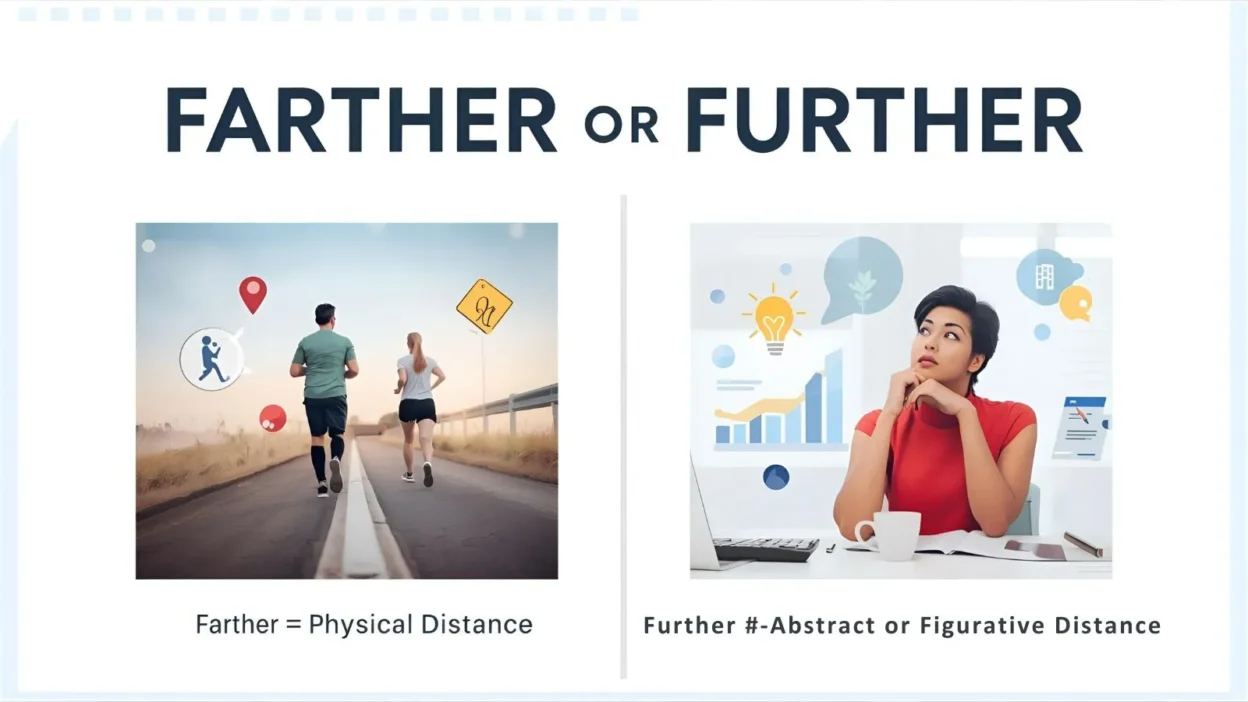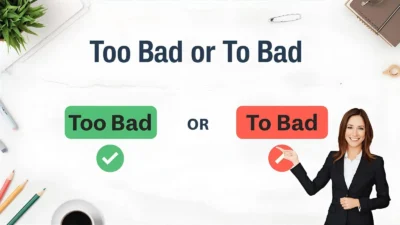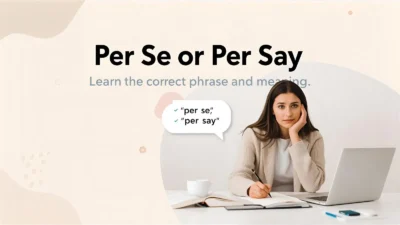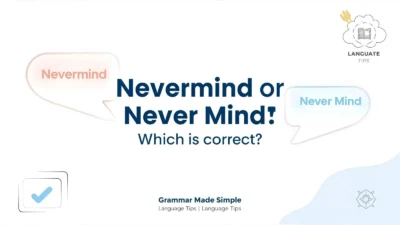Have you ever stopped mid-sentence wondering, “Should I say farther or further?” I’ve been there too — and trust me, it can be confusing! Both words sound the same and even seem to mean the same, but they don’t.
The real trick is knowing when to use each one — is it about distance or ideas? That’s where most people get stuck. In this quick guide, I’ll show you simple examples and an easy rule that will make the difference crystal clear.
By the end, you’ll never hesitate again — and you’ll sound instantly more confident every time you write or speak.
Let’s settle the “Farther or Further” debate once and for all! 🚀
Farther or Further – Quick Answer 🚦
The simple rule:
- Farther = physical distance (measurable)
- Further = figurative distance (abstract or symbolic)
✅ Examples:
- I walked farther than my friend. (physical distance)
- Let’s discuss this further tomorrow. (abstract idea)
👉 Tip: If you can measure it with a ruler or map, use farther. If it’s about ideas, use further.
The Origin of Farther or Further 🕰️
Both words come from the Old English root “fierðra”, meaning “more distant.”
Originally, further was used for both physical and metaphorical meanings. Later, farther appeared as a spelling variation influenced by the word far.
Over time, grammarians began associating farther with physical space and further with abstract contexts.
Even today, some English speakers use them interchangeably — but in modern formal writing, it’s best to distinguish the two for clarity and precision.
British English vs American English Spelling 🇬🇧🇺🇸
In both British and American English, the spelling of farther and further remains the same — but the usage preference can differ.
| Region | Preferred Term | Common Use |
|---|---|---|
| United States | Farther | Physical distance |
| United States | Further | Abstract/figurative |
| United Kingdom | Further | Used for both meanings |
| Australia/Canada | Further | Preferred in most cases |
📝 In short: Americans tend to separate them, while Brits often use further for everything.
Which Spelling Should You Use? 🌍
If you’re writing for:
- U.S. readers: Use farther for distance and further for ideas.
- U.K. or global audience: Further is perfectly acceptable for both meanings.
- Academic or professional writing: Follow the American distinction to sound precise.
👉 Example:
- She drove farther down the highway.
- We need to go further into this research.
Common Mistakes with Farther or Further ⚠️
❌ Let’s walk further down the road.
✅ Let’s walk farther down the road. (physical distance)
❌ Can you explain that farther?
✅ Can you explain that further? (idea or explanation)
Another frequent mistake: using farthermore instead of furthermore. Remember — furthermore is always correct; farthermore isn’t a real word!
Farther or Further in Everyday Examples 💬
Emails:
- I’ll contact you further once I have an update.
News Articles:
- The rescue team traveled farther into the forest.
Social Media:
- Pushing myself farther every day feels amazing!
Formal Writing:
- Further research is required to validate the hypothesis.
These examples show how context determines which form fits best — so always check whether you mean distance or depth.
Farther or Further – Google Trends & Usage Data 📊
Data from Google Trends shows that “further” is searched and used more often than “farther” globally.
| Term | Popularity (Global) | Top Countries |
|---|---|---|
| Further | 78% | UK, Australia, India, Canada |
| Farther | 22% | USA, Philippines |
The trend reflects that further is more versatile and widely accepted, while farther remains popular primarily in American English.
Comparison Table: Farther vs Further 📘
| Usage Type | Farther | Further |
|---|---|---|
| Physical distance | ✅ | ⚠️ (less common) |
| Abstract idea | ❌ | ✅ |
| British English | ⚙️ (rare) | ✅ |
| American English | ✅ (distance) | ✅ (idea) |
| Example Sentence | “He ran farther.” | “We’ll talk further.” |
FAQs 💡
1. Can I use “further” instead of “farther”?
Yes, especially in British or global English. Further works in almost every situation.
2. Is “farther” outdated?
No, it’s still correct — mainly for physical distances in American English.
3. Which is more formal, farther or further?
Further is more formal and commonly used in academic and business writing.
4. Can “further” mean “more”?
Yes! Example: Further information will be provided soon.
5. Is “go further” correct?
Absolutely. It means to continue, proceed, or advance in discussion or effort.
6. How do I remember the difference?
Think: FAR is inside FARther → physical distance.
7. Are “furthermore” or “farthermore” correct?
Only furthermore is correct. Farthermore doesn’t exist.
Conclusion
Both farther and further are correct — but knowing when to use each shows mastery of English nuance. Use farther when you’re talking about physical distance, like “running farther,” and further when you’re describing ideas, explanations, or time, like “further discussion.”
If you write for an international audience, further is the safer, more flexible choice. It’s widely understood and grammatically correct in almost every context.
However, if your readers are primarily American, keeping the traditional distinction can help your writing sound more precise and professional.
Next time you’re unsure which one to pick, remember this rule: If it’s measurable, use farther. If it’s mental, use further. Simple, clear, and smart! ✨



